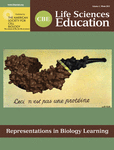Using Learning Principle in Faculty Development Workshops
Dear Editor:
There is an urgent need for those in national leadership positions in biology, and in science, technology, engineering, and mathematics at large, to incorporate strategies that truly promote learning into their professional development programs. Not only because the audiences will learn/remember more, but also because transforming what happens in undergraduate classrooms requires faculty assumptions to be challenged regularly and new models for behavior to be presented.
I recently attended a workshop run by a national organization with a long history of bringing innovation to undergraduate education. All of the plenary sessions were PowerPoint presentations of more than 50-min duration that largely repeated information from our homework assignments. I was surprised and disappointed. Yes, I found some gems in the lectures. Yes, the workshop format meant that my institutional team spent a great deal of time working on an action plan. Yes, I networked with colleagues and came away with many ideas. But I left feeling as though a great opportunity had been missed.
The chance to model ways that align what is known about how people learn with pedagogical methods was completely overlooked. The plenary speakers did not engage our misconceptions or begin with our existing knowledge; we were not given a chance to apply or reflect; we were not asked to interact with our peers. We could have been given minilectures or quick readings and then asked to apply the content to problems at our home institutions. We could have been the ones drawing conclusions from the evidence or building the arguments needed to persuade others. We were not even asked to utilize the most basic active-learning strategies, such as think-pair-share or the 1-min paper. None of these occurred, despite the fact that our homework had included references to both a national effort to shift from a teaching paradigm to a learning paradigm and the importance of leaders in effecting systemic change, particularly by modeling new behaviors.
The discussion of using learning principles to inform college teaching has certainly reached the national level. There is William Wood's article in the 2009 volume of the Annual Review of Cell and Developmental Biology (Wood, 2009). There are abundant examples in this quarterly publication (Tanner, 2012; Wood and Tanner, 2012). Science has devoted space to making the case for transforming undergraduate education (Anderson et al., 2011). And, of course, there is the Vision and Change document (American Association for the Advancement of Science, 2010), a joint publication by the National Science Foundation, the National Institutes of Health, and the Howard Hughes Medical Institute, calling for, among other things, a focus on student-centered learning.
It is true that the topic of the workshop I attended was not how to incorporate active-learning strategies into classroom practice. Still, the plenary speakers are nationally recognized as proponents for improving undergraduate education. No doubt they have encountered these ideas. I cannot help wondering why these people who care so deeply did not do things differently. My own experiences give me a few hypotheses. The speakers may, like our own students, have done the reading and encountered the ideas, but do not yet see the deeper meaning, so they cannot transfer the knowledge to new situations. Or perhaps they do not yet share a vision of something so compelling that the required change in themselves is a priority when measured against all the other things they do. How hard will it be to change our college classrooms into true learning environments when even our national leaders find it so difficult?
I want to suggest that persons such as those leading our workshop have particular responsibility for modeling best practices, even if their personal passion is service learning or first-year seminars or quantitative skills across the curriculum or research-rich experiences. Yes, it means new work for them, new learning for them, more effort for them. But given their prominence on the national scene, it is incumbent upon them to transform their own teaching so that learners (in this case intractable faculty) regularly experience teaching models that challenge their assumptions about what is possible. Every time faculty arrive at a workshop, we ought to encounter methods of presentation well beyond the traditional PowerPoint lecture.



